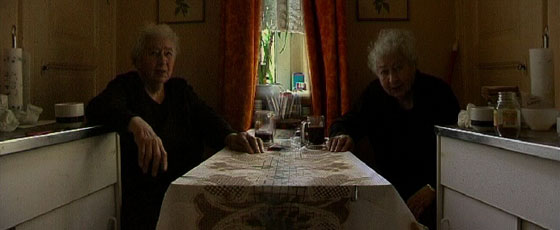
Anna
Konik |
Voiceless
Voiceless is the title under which Anna Konik shows two new projects: Transparency
and In the Middle of the Way. Both these works seem to contradict the
title as in them the artist grants those who do not usually have a
voice an opportunity to speak. Voiceless is the story of “others” – the
aged, the lonely, the homeless. In its two component pieces, individuals
who are members of socially marginalized groups get the chance to tell
us about themselves, lead us along the paths of their lives, talk us
through their feelings and values. Their stories are barely audible
and you must stop and focus for a few moments to hear what they have
to say. These encounters could hardly have been easy for the artist.
Her subjects might seem comic or grotesque to others, yet she treats
them with the utmost seriousness and respect, and it is her far-reaching
openness, I believe, that renders her capable of this. A silent and
impartial listener, she gives them the chance to tell their touching
and often wise stories.
Transparency features Mija of Berlin, Mr. Thaddeus of Warsaw and Madame
Wichmann and Mr. Brozy of Stuttgart – a quartet of people who are
advanced in their years and very lonely. They tell seemingly commonplace
life stories of unfulfilled dreams, love, devotion and solitude, but the
artist presents these stories told by people aware of their own imminent
end in an unusual manner. Anna Konik’s subjects have been filmed
so as to be “transparent” – in their homes, sitting at
tables and looking directly into the camera; their images have been doubled
and their statements, at first glance merely reluctant confessions made
to the artist, become original, new narratives. For Konik has filmed each
of her subjects twice – each time in the same space and recounting
what seems to be the same life story. Their dual images juxtaposed, her
subjects seem to listen as much as they speak, sometimes agreeing and at
other times disagreeing with themselves. Entering the installation, you
encounter a life-size figure (Mija sitting at her table or pushing her
shopping cart, or Mr. Brozy in his wheelchair) and – willing or not – witness
an intimate confession that is at once a monologue, a strange dialogue
and the conversation of someone with their own mirror image. The artist’s
singular form of presentation is emphasized through the “oddity” of
her subjects, whose behavior hardly fits our idea of “normal” life,
reality.
Ania Konnk has an amazing sense of people, she knows how to listen to them
and make them feel comfortable. Only these abilities can explain why her
collaborators seem to trust her. Without ever posing or being theatrical,
they speak of their defeats and unfulfilled ambitions, of love, solitude
and the houses they never built...
Ika Sienkiewicz-Nowacka
| Project produced in cooperation with Akademie Schloss Solitude, Stuttgart, Kunsthochschule Berlin - Weisensee and CCA Ujazdowski Castle, Warsaw. Collaboration and technical support Gunter Eisermann (Kunsthochschule Berlin - Weisensee). | |||
|
|||
|
|||
In the Middle of the Way
(Warsaw, Berlin, Moscow and Dobrodzie_ – again) 2001 – 2005,
work in progress
Anna Konik’s In the Middle of the Way spans both time and space.
The artist made its first part in April 2001 in Warsaw, the second in
October 2002 in Berlin, the third in March 2005 in Moscow, and its last
installment – focusing on herself – at the turn of April
and May 2005 in Berlin, Warsaw and in Dobrodzie_, the small town in southern
Poland that is the artist’s hometown. The artist aims to add installments
made in other European cities and perhaps even on other continents in
the future.
In the Middle of the Way is a kind of performance that plays out between
the artist and the project participants – though this performance
has no audience, no witnesses. It is also a kind of filmed essay on “homelessness.” Anna
Konik spends a single day with randomly encountered individuals, asking
them to tell their stories, show her the places that are important to
them. Thus, we learn about these people and the cities they inhabit.
In the fourth and final film the artist talks about herself, the places
that played an important part in her life, her incessant traveling – her
being “on the road.”
In her works, Anna Konik shows us people who live at the fringes of society,
people we pass on the street every day without noticing. With In the Middle
of the Way, the artist focuses on the homeless. Her subjects show themselves
to be living in constant motion, to be incessantly on the road. They belong
to no specific place and have no home, and thus are simultaneously free as
they can make their home anywhere. Anna Konik’s protagonists live more
of their lives in their own inner worlds than in the reality that surrounds
them. They have found homes for themselves within themselves.
In its current form, Anna Konik’s In the Middle of the Way links three
capitals – Berlin, Warsaw and Moscow – and the small town of Dobrodzie_.
We discover all these places through various stories of “homelessness.” The
artist demonstrates that something links these cities which are otherwise so
different from each other: that something is people like Thaddeus of Warsaw,
Hermann of Berlin, Svyetlana of Moscow and the artist herself – eternal
wanderers living somewhere between the real world and a reality they have created
by themselves within themselves.
Ewa Witkowska
